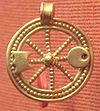Borvo or Bormo (Gaulish: *Borwō, Bormō) was an ancient Celtic god of healing springs worshipped in Gaul and Gallaecia. He was sometimes identified with the Graeco-Roman god Apollo, although his cult had preserved a high degree of autonomy during the Roman period.
Name
The Gaulish theonym Boruō means 'hot spring', 'warm source'. It stems from the Proto-Celtic verbal root *berw- ('boil, brew'; cf. Old Irish berbaid, Middle Welsh berwi), itself from Proto-Indo-European *bʰerw- ('boil, brew'; cf. Latin ferueō 'to be intensely hot, boil', Sanskrit bhurváni 'agitated, wild'). The Bhearú river (River Barrow) in Ireland has also been linked to this Celtic root.
The variant Bormō could have emerged from a difference in suffixes or from dissimilation. Known derivates include Bormanicus (Caldas de Vizela), from an earlier *Borwānicos, and Bormanus or Borbanus (Aix-en-Diois, Aix-en-Provence), from an earlier *Borwānos. A goddess named Boruoboendoa, perhaps reflecting the Gaulish theonym *Buruo-bouinduā or *Buruo-bō-uinduā, has also been found in Utrecht.
The toponyms Bourbon-l'Archambault, Bourbon-Lancy, Bourbonne-les-Bains, Boulbon, Bormes, Bourbriac, La Bourboule and Worms are derived from Borvo or from its variant Bormo. The names of various small rivers in France, such as Bourbouillon, Bourban, and Bourbière, also stem from the theonym.
Centres of worship

In Gaul, he was particularly worshipped at Bourbonne-les-Bains, in the territory of the Lingones, where ten inscriptions are recorded. Two other inscriptions are recorded, one (CIL 13, 02901) from Entrains-sur-Nohain and the other (CIL 12, 02443) from Aix-en-Savoie in Gallia Narbonensis. Votive tablets inscribed ‘Borvo’ show that the offerers desired healing for themselves or others. Many of the sites where offerings to Borvo have been found are in Gaul: inscriptions to him have been found in Drôme at Aix-en-Diois, Bouches-du-Rhône at Aix-en-Provence, Gers at Auch, Allier at Bourbon-l'Archambault, Savoie at Aix-les-Bains, Saône-et-Loire at Bourbon-Lancy, in Savoie at Aix-les-Bains, Haute-Marne at Bourbonne-les-Bains and in Nièvre at Entrains-sur-Nohain.
Findings have also been uncovered in the Netherlands at Utrecht, where he is called Boruoboendua Vabusoa Labbonus, and in Portugal at Vizela and at Idanha-a-Velha, where he is called Borus and identified with Mars. At Aix-en-Provence, he was referred to as Borbanus and Bormanus but at Vizela in Portugal, he was hailed as Bormanicus, and at Burtscheid and at Worms in Germany as Borbetomagus.
Divine entourage
Borvo was frequently associated with a divine consort, usually Damona (Bourbonne, Bourbon-Lancy), but sometimes also Bormana when he was worshipped by the name Bormanus (Die, Aix-en-Diois). Bormana was in some areas worshipped independently of her male counterpart, such as at Saint-Vulbas.
Deo Apol/lini Borvoni / et Damonae / C(aius) Daminius / Ferox civis / Lingonus ex / voto
— Corpus Inscriptionum Latinarum (CIL), 13: 05911. Bourbonne-les-Bains.
Bormano / et Borman / P(ublius) Sappinius / Eusebes v(otum) s(olvit) / l(ibens) m(erito)
— Corpus Inscriptionum Latinarum (CIL), 12: 01561. Boubon-Lancy.
Borvo bore similarities to the goddess Sirona, who was also a healing deity associated with mineral springs. According to some scholars, Sirona may have been his mother.
In other areas, Borvo's partner is the goddess Bormana. Bormana was, in some areas, worshipped independently of her male counterpart. Gods like Borvo, and others, equated with Apollo, presided over healing springs, and they are usually associated with goddesses, as their husbands or sons. He is found in Drôme at Aix-en-Diois with Bormana and in Saône-et-Loire at Bourbon-Lancy and in Haute-Marne at Bourbonne-les-Bains with Damona but he is accompanied by the ‘candid spirit’ Candidus in Nièvre at Entrains-sur-Nohain. In the Netherlands at Utrecht as Boruoboendua Vabusoa Lobbonus, he is found in the company of a Celtic Hercules, Macusanus and Baldruus.
References
- MacKillop 2004, s.v. Borvo.
- ^ Busse & vaan de Weil 2006, pp. 230–231.
- Green 1986, p. 162: "Borvo, like Belenus, appears more often by himself than linked with Apollo, emphasising the essentially Celtic nature of the cult."
- ^ Delamarre 2003, p. 83.
- Matasović 2009, p. 63.
- Monnier, Nolwena (2019). "Nommer la nature : toponymie de la nature dans la Topographia Hibernica de Gerald of Wales". Études irlandaises (44–1): 31–46. doi:10.4000/etudesirlandaises.6884. ISSN 0183-973X.
- ^ Charrière 1975, pp. 130–131.
- Quintela, Marco (2005). "Celtic Elements in Northwestern Spain in Pre-Roman times". E-Keltoi: Journal of Interdisciplinary Celtic Studies. 6 (1). ISSN 1540-4889.
- Delamarre 2003, pp. 79, 83.
- Corpus Inscriptionum Latinarum (CIL), 13: Tres Galliae et Germanae.
- Corpus Inscriptionum Latinarum (CIL), 12: Gallia Narbonensis.
- MacCulloch, J. A. (1911). The Religion of the Ancient Celts.
- ^ "Société de Mythologie Française (SMF)". Archived from the original on 2003-02-07. Retrieved 17 February 2021.
- Garrett S. Olmsted, "The gods of the Celts and the Indo-Europeans", page 427
- ^ MacKillop 2004, s.v. Borvo.
- Miranda Green. Dictionary of Celtic Myth and Legend. Thames and Hudson Ltd. London. 1997
- Paul-Marie Duval. 1957-1993. Les dieux de la Gaule. Presses Universitaires de France / Éditions Payot. Paris.
- Miranda Green. Dictionary of Celtic Myth and Legend. Thames and Hudson Ltd. London. 1997
- The Religion of the Ancient Celts: Chapter XII. River and Well Worship
Bibliography
- Busse, Peter E.; vaan de Weil, Caroline (2006). "Borvo/Bormo/Bormanus". In Koch, John T. (ed.). Celtic Culture: A Historical Encyclopedia. ABC-CLIO. pp. 195–200. ISBN 978-1-85109-440-0.
- Charrière, Georges (1975). "La femme et l'équidé dans la mythologie française". Revue de l'histoire des religions. 188 (2): 129–188. doi:10.3406/rhr.1975.6132. ISSN 0035-1423. JSTOR 23668651.
- Delamarre, Xavier (2003). Dictionnaire de la langue gauloise: Une approche linguistique du vieux-celtique continental. Errance. ISBN 9782877723695.
- Green, Miranda J. (1986). The Gods of the Celts. A. Sutton. ISBN 978-0-389-20672-9.
- MacKillop, James (2004). A dictionary of Celtic mythology. Oxford University Press. ISBN 0-19-860967-1.
- Matasović, Ranko (2009). Etymological Dictionary of Proto-Celtic. Brill. ISBN 9789004173361.
| Celtic mythology series | ||
|---|---|---|
| Ancient deities of Gaul, Britain and Gallaecia by region | ||
| Supra-regional |
|   |
| Britannia | ||
| Gallia Aquitania | ||
| Gallia Belgica | ||
| Gallia Celtica | ||
| Gallia Cisalpina | ||
| Gallia Narbonensis | ||
| Germania Inferior | ||
| Gallaecia | ||